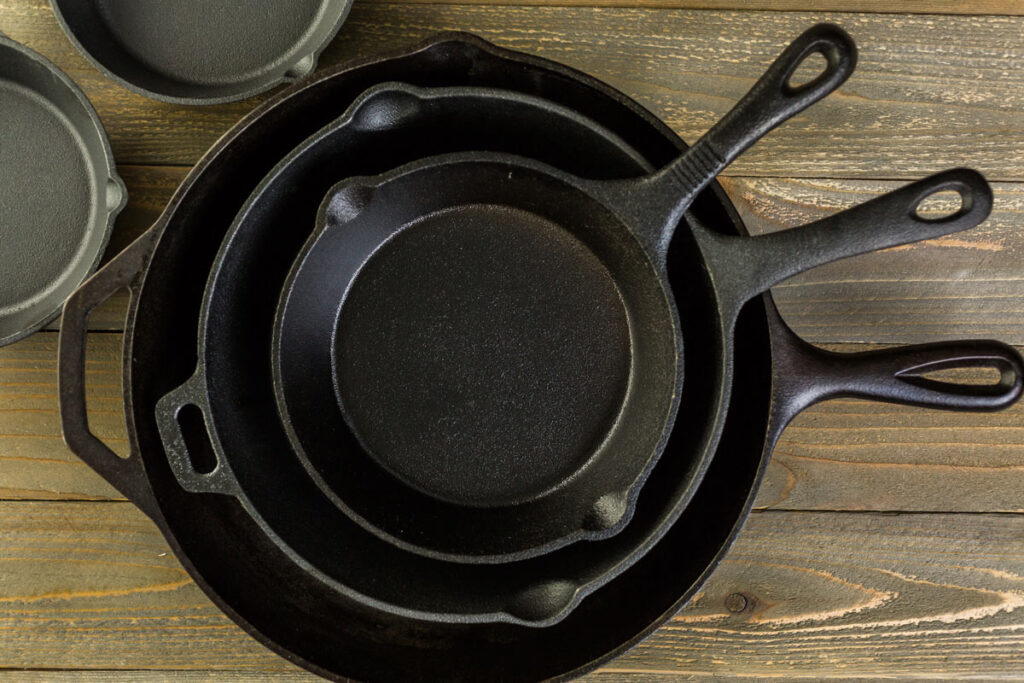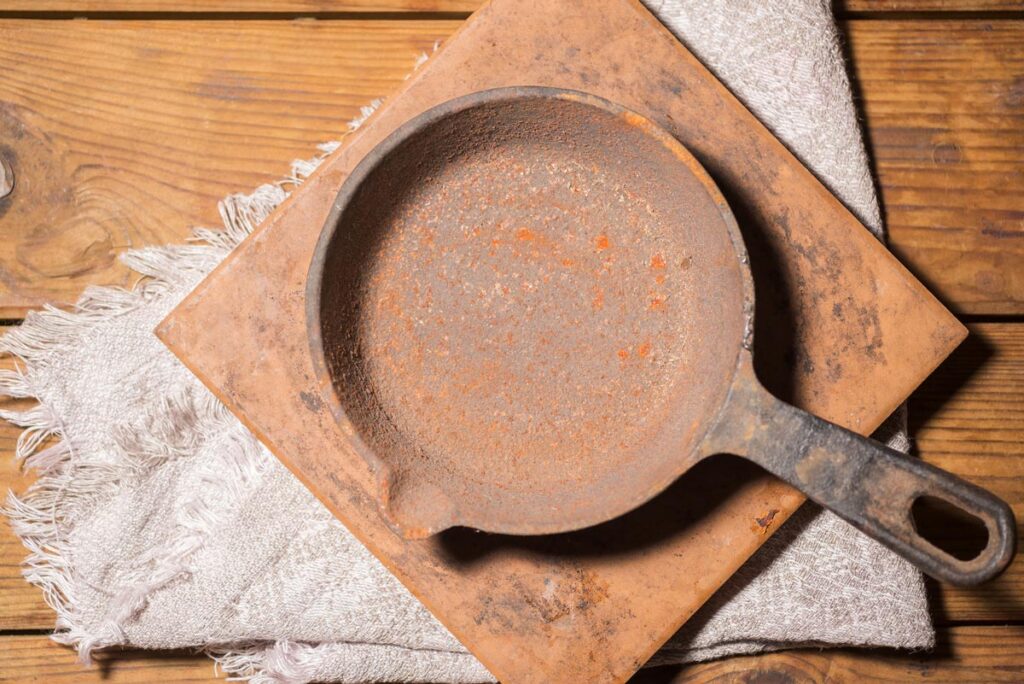Wondering if you should take the leap into cooking with cast iron? Keep reading as I make my case for cast iron cookware, share the incredible benefits of cooking with cast iron, dispel common myths about cast iron, as well as share my favorite cast iron cookware.

When I began adulting as a young 20 year old, one of the first things I knew I needed was a cast iron pan. Everyone needs to have something to cook with in the kitchen!
I really don’t know why I decided on cast iron at that point, but my first pan was literally delivered on my doorstep the day I moved into my house. I promptly stuck it in the dishwasher to clean it, and if you have ANY experience with cast iron, you know what happened! That rusty, orange pan lived it’s first three years of life in the cabinet.
When our first child was born and developed severe food allergies, my research of foods and cooking began. I came upon a cookbook that I still use to this day… Mad Hungry: Feeding Men and Boys by Lucinda Scala Quinn.
In fact, one of my favorite meals to cook is her Spatchcock chicken recipe which you can see me cook and get the recipe here. The author speaks a lot about the benefits of cast iron cookware. So, I unearthed my rusty, orange pan, learned how to actually care for it, and have never looked back!
Why Use Cast Iron?
Cast iron is the most versatile cookware I know of! It can be used for:
- Sauteing
- Searing
- Baking
- Braising
- Broiling
- Roasting
- Over the campfire
- etc.
It comes in all shapes and sizes. The four pans that I use the most are 6,10,12, and 14 inch sizes. I use these every day for nearly all my cooking!
The Best Place To Buy Cast Iron
My favorite place to find cast iron is at garage sales, estate sales, or thrift stores. Not all cast-iron is created equal! You can tell if it’s a good quality by how thick-walled it is.
Typically, older pans are made better. If you find a used pan, and it looks rough, don’t skip it! It will take some work, but with a little sanding, seasoning, and elbow grease you can bring it back to life. The most important thing to look for is that it's not warped. A warped pan isn't salvageable and, although it will still cook food, it will wobble back and forth on the stovetop.
Today, there are a lot of cheaper cast iron pans available with thinner walls which won’t retain heat or cook as well.
If you’re buying new, Lodge Cookware is hands-down my highest recommendation. It’s made in the USA, been around for a really long time, and the quality is consistent.

How To Season And Maintain Cast Iron Pans
There are a few things to know about maintaining cast iron pans, but please don’t let it overwhelm you! Seasoning cast iron is simply giving it a slick coating to make it non-stick. If the pan is seasoned correctly, cleaning it is a breeze!
When you first buy a cast iron pan, it might say that it is pre-seasoned. I don’t know what that substance is, but it’s not truly seasoned well enough in my opinion.
- Fix yourself some hot, soapy water and scrub the tar out of it!
- Rub it down with vegetable oil or shortening and then wipe as much of the oil back off with a clean cloth or paper towel as you can.
- Bake it upside down in a 325° F oven for 2 hours.
- The first few times you cook in the pan, cook something fatty like bacon.
- After cooking, clean the pan with either salt and water or steel wool. No soap necessary as iron doesn’t harbor bacteria.
- Dry with a paper towel and oil it down with a thin coating of oil.
- Turn on a burner and allow the pan to heat up again to dry completely and seal in the oil.
- Store it. I like to hang mine on the wall, but you can store it in a cabinet also. You might want to place paper towels between pans if you’re stacking them.
It is not a fussy thing! It’s so easy to use and care for!
Benefits Of Using Cast Iron
There are many benefits of using cast iron, but my favorite is that it is truly heritage cookware. If you buy it, use it regularly, and love it, your family will treasure it!
You Can’t Ruin It
You might mess up the seasoning, but just follow the simple steps to redo it! If you buy it looking like it’s been setting out in the weather for a decade, scrub it, season it, and give it a new life with a story to tell!
It’s heavy duty, so if you drop it, it won’t break. Now, if you drop it on your glass stove top or your foot, the other half of the equation might bear some damage!
Really the only thing to look out for with cast iron is going from extreme heat to extreme cold. So don't take it straight from the oven and pour cold water into it. This can actually warp the iron.
Other than that, it's pretty foolproof.
Health Benefits
If you’ve done any amount of research on Teflon products, you will have learned that it’s not really something you want to be cooking with. The surface material is chemical laden to give it that non-stick finish.
If seasoned properly to give it a non-stick finish, cast iron will actually help you cut back on the amount of oil you will need to cook your food. Cast iron cookware will also help supplement your iron intake for your body.
I have struggled with being border-line anemic at times, and it can be a struggle to take in enough iron. Knowing that my cookware is helpful in this is obviously a positive.
Misconceptions About Cast Iron
- It's hard to use – People think it’s hard to use, and they don’t want to deal with it. They end up spending lots of money on cookware they will likely have to replace every few years. In reality, it’s about as easy and simple to care for as it gets, and you may never have to buy cookware again in your life!
- You can't use soap – Another thing that scares people is they are told you can’t use soap. Iron doesn’t harbor bacteria, so you don’t NEED to use soap, but if soap gets on your pan, simply oil it again and dry it well. Soap will mess with the seasoning, since soap is designed to dissolve oil, but it won’t ruin the pan.
- Can't cook acidic foods – Cast iron is reactive, so people will sometimes tell you not to cook acidic foods like tomatoes in it. I’ve never done anything differently with my tomatoes and have never had a problem.
- Food will taste metallic – I have also heard that foods will sometimes taste metallic. I am very sensitive to the taste and smells of food, and I have never had this issue no matter what I cook.
- Uneven cooking – Uneven cooking is another common misconception. Cast iron is not known to heat evenly, but it will cook evenly. The pans retain heat and move it around the pan so that it will cook the food evenly.

Enameled Cast Iron
I have a few pieces of enameled cast iron that I use. My Dutch oven cast iron is enameled. It heats and retains heat like regular cast iron having the same properties.
Enameled is used like traditional cast iron, but you wash it with soap because it doesn’t have the antimicrobial properties that regular cast iron does.
Sam’s Club carries a brand called Tramontina that is really good quality, or Lodge also carries enameled cast iron.















